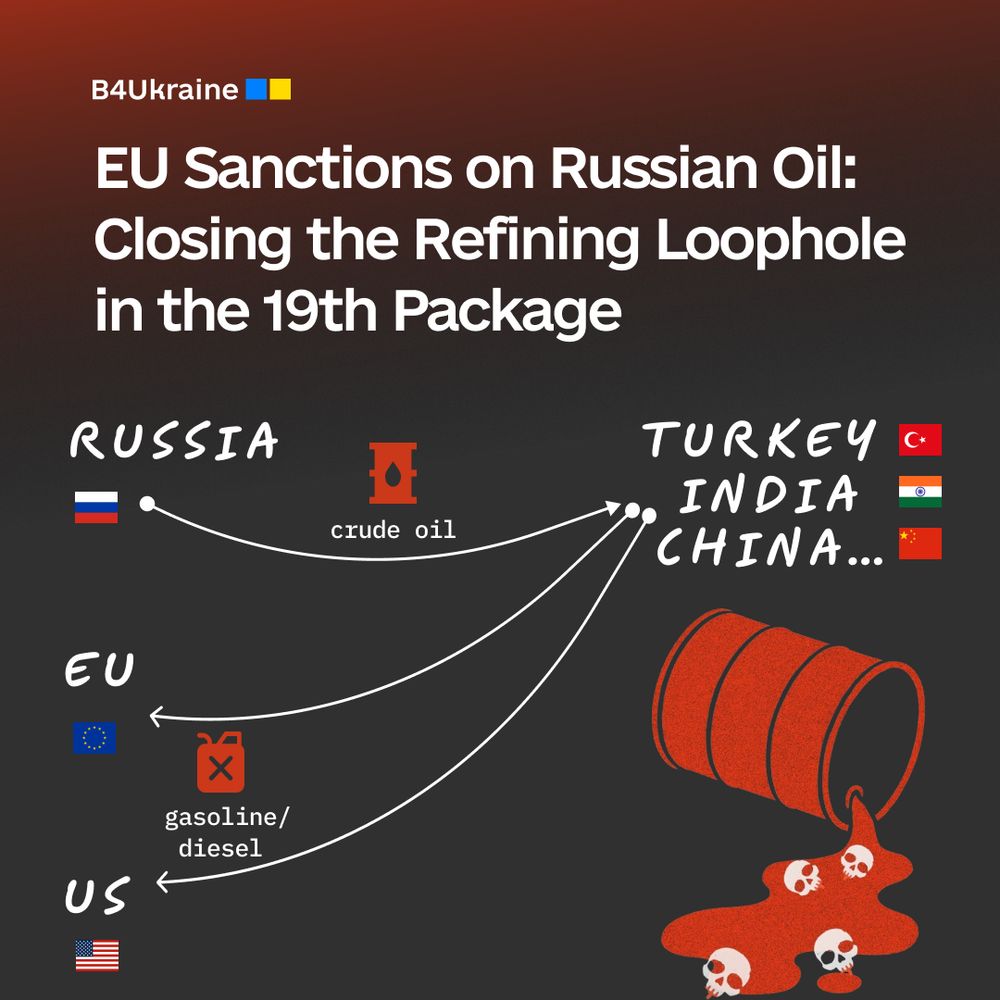
Together with partner organisations, B4Ukraine has sent a letter to the European Commission welcoming the ban on oil products made from Russian crude in the EU’s 18th sanctions package, and urging the Commission to address several remaining loopholes that risk undermining its impact.
Dear High Representative Kallas,
We, the undersigned civil society organisations, write to welcome the European Commission’s inclusion of a ban on the import of oil products made from Russian crude in the EU’s 18th sanctions package. This important step reflects a clear recognition of the need to close one of the most persistent and lucrative revenue streams sustaining Russia’s war against Ukraine.
In 2024 alone, the EU is estimated to have sent Russia €3.5 billion in crude oil export earnings through the legal importation of oil products from refineries in non-sanctioning countries. Just six major refineries, which heavily rely on Russian crude oil, are responsible for these exports. While the EU’s imports from these refineries account for 7% of its seaborne imports, 23% of the refineries’ total exports are directed to the EU—meaning the ban will significantly affect them and disincentivize further purchases of Russian crude.
Ending this flow of funds to the Kremlin is vital for aligning EU trade policy with the Union’s broader objectives of upholding European and Ukrainian security and sovereignty.
At the same time, we respectfully urge the Commission to address several remaining loopholes that may limit the full impact of these measures. We recommend that these issues be clearly and decisively addressed in the forthcoming 19th sanctions package:
1. Exemptions for Net Crude Oil Exporters
The proposed exemption for countries classified as net crude oil exporters in the previous calendar year introduces a structural loophole. Net export status does not preclude the import and refining of Russian-origin crude, especially in jurisdictions with flexible or opaque crude sourcing practices. To close this enforcement gap, the exemption should be applied at the refinery level, not the national level. Refined petroleum products should be subject to import restrictions if produced at facilities that have processed Russian crude within the past six months, regardless of the final product’s declared origin or the host country’s net export position.
2. Verification and Enforcement
Relying solely on certificates of crude origin introduces significant enforcement challenges, as these documents can be falsified, incomplete, or unverifiable. Trade data and tanker tracking have revealed systematic re-export of Russian-origin refined products through third countries into the EU, as observed in an investigation of Turkish ports.
To address this, a refinery-level sourcing rule should be introduced: refined petroleum products should be prohibited from import if produced at refineries that have received any Russian crude oil within the previous rolling six-month period, regardless of the declared origin of the final product.
This approach ensures traceability and avoids reliance on weak documentation. A refinery may regain eligibility once it demonstrates six consecutive months of operations without Russian crude, verified by Commission-approved independent auditors and, where feasible, included in a publicly accessible EU compliance registry.
To prevent circumvention, repeat exposure to Russian crude should trigger an extended exclusion period (e.g. twelve months for a second violation). A limited exemption mechanism may be maintained, subject to strict disclosure, oversight, and review by the Commission to ensure alignment with the sanctions’ objectives.
3. Six-Month Wind-Down Period
The current grace period provides Russia, as well as traders buying oil refined using Russian crude, with excessive time to adjust supply chains and maintain oil revenue. If flows remain stable, EU imports of products refined from Russian crude could generate an estimated €1.1 billion for the Kremlin. A shorter 60-day wind-down period, focused on high-risk refined products like diesel and jet fuel, would reduce Russia’s fiscal gains and limit circumvention opportunities. It would also give the EU sufficient time to secure alternative suppliers.
4. Re-Export Loopholes
The exemption of countries including the UK, USA, Canada, Norway, and Switzerland creates an opportunity for oil products refined from Russian crude to be re-exported to the EU. This gap should be closed to ensure the sanctions are comprehensive and watertight. As the first jurisdiction to close the refining loophole, the EU should work with partners to encourage them to follow suit.
We believe addressing these issues in the 19th sanctions package is essential to ensuring the EU’s sanctions regime remains effective, credible, and aligned with its strategic objectives. By doing so, the Commission can also help establish a global benchmark that other democratic partners can replicate in their own efforts to support a free and sovereign Ukraine.
We remain at your disposal to offer any assistance or analysis in support of these goals and thank you for your continued leadership.
Yours sincerely,
• Nezir Sinani, Executive Director, B4Ukraine Coalition
• Isaac Levi, Europe-Russia Policy & Energy Analysis Team Lead, Centre for Research on Energy and Clean Air
• Martin Vladimirov, Director, Energy and Climate Program, Center for the Study of Democracy
• Kristofer Harrison, Founder and President, The Dekleptocracy Project
• Simon Papuashvili, Programme Director, Eastern Europe/South Caucasus, International Partnership on Human Rights
• Olena Halushka, Head of the Board, International Center for Ukrainian Victory
• Dr. Svitlana Romanko, Founder and Executive Director, Razom We Stand